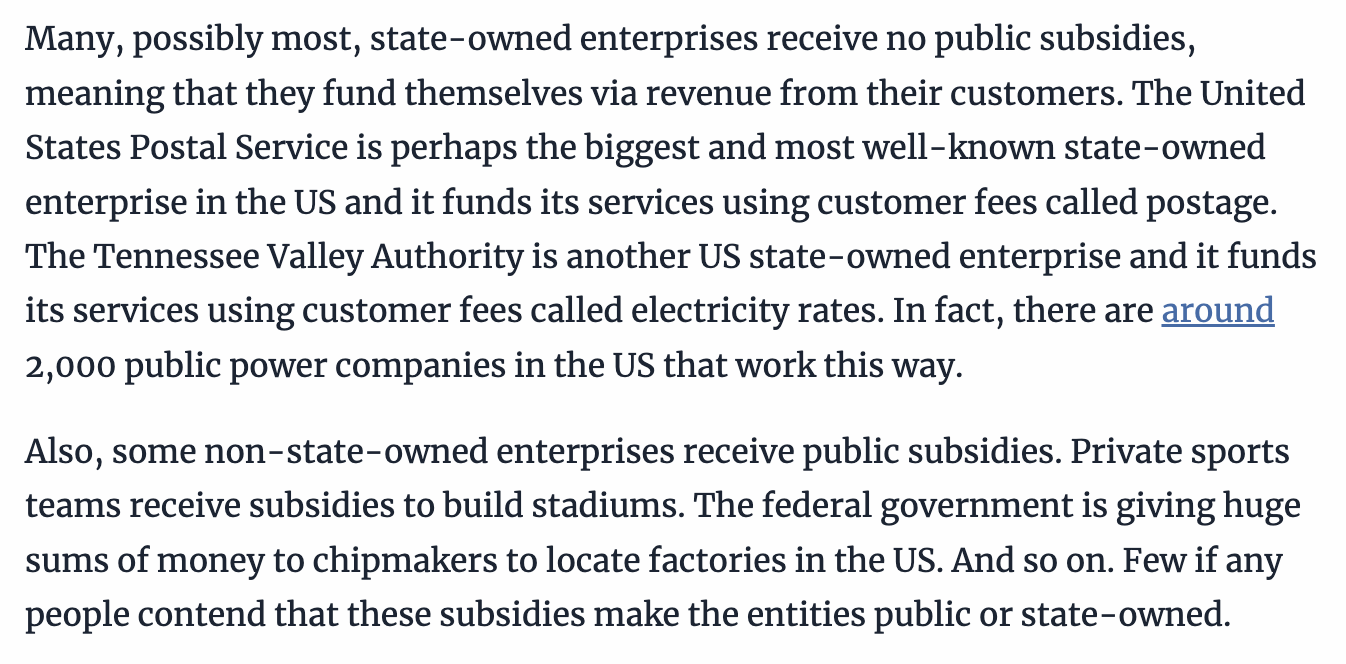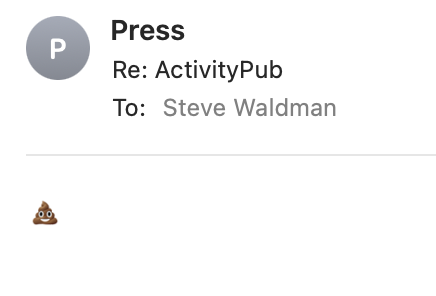mischievous high-school kids in Florida are going to have so much fun bringing up topics their teachers could get in trouble for talking about.
@mattlehrer omg this is the greatest day of my life.
undisguised vindictiveness is a hallmark of the contemporary right. https://journa.host/@dell/110227348408885700
Margaritaville feels awfully uptight these days.
what twitter address do you write to get your free 💩 emoji?
when you say you are asking nicely, you are not.
[new draft post] Taiwan https://drafts.interfluidity.com/2023/04/18/taiwan/index.html
we’re going to extend copyright, like, forever just because we are so grateful.
from #MattBruenig https://mattbruenig.com/2023/04/12/is-national-public-radio-actually-national-private-radio/
 Many, possibly most, state-owned enterprises receive no public subsidies, meaning that they fund themselves via revenue from their customers. The United States Postal Service is perhaps the biggest and most well-known state-owned enterprise in the US and it funds its services using customer fees called postage. The Tennessee Valley Authority is another US state-owned enterprise and it funds its services using customer fees called electricity rates. In fact, there are around 2,000 public power companies in the US that work this way. Also, some non-state-owned enterprises receive public subsidies. Private sports teams receive subsidies to build stadiums. The federal government is giving huge sums of money to chipmakers to locate factories in the US. And so on. Few if any people contend that these subsidies make the entities public or state-owned.
Many, possibly most, state-owned enterprises receive no public subsidies, meaning that they fund themselves via revenue from their customers. The United States Postal Service is perhaps the biggest and most well-known state-owned enterprise in the US and it funds its services using customer fees called postage. The Tennessee Valley Authority is another US state-owned enterprise and it funds its services using customer fees called electricity rates. In fact, there are around 2,000 public power companies in the US that work this way. Also, some non-state-owned enterprises receive public subsidies. Private sports teams receive subsidies to build stadiums. The federal government is giving huge sums of money to chipmakers to locate factories in the US. And so on. Few if any people contend that these subsidies make the entities public or state-owned.
"Boeing is not in the business of making planes, it is in the business of making profits." #MatthewSaroff https://40yrs.blogspot.com/2023/04/still-cant-make-planes.html
// one way to understand the neoliberal period is as a time when people absurdly believed that corporations face no important trade-offs between generating payouts for shareholders and doing real work in the world.
"'A Commission serious about regulating—and not destroying—this market' would be a different SEC! You don’t have to like it, but it is easy to know what the SEC wants." @matt_levine on the state of play in US crypto regulation. https://www.bloomberg.com/opinion/articles/2023-04-17/the-sec-comes-for-bittrex
"So many things that people claim are impossible we once had in living memory and yet people often cannot even accurately recall their own lives and experiences." #quoderat http://www.technologyasnature.com/railroaded/ #ViaRSS
@misc @Jonathanglick Sounds wonderful, assimilate me!
@misc @Jonathanglick Right. I don't think framing a binary is very helpful. Harris Mylonis in his "Politics of Nation Building" helpfully divides nation-state strategies for managing subgroups between assimilation, accommodation, and restriction (the latter of which *in extremis* includes transfer or extermination).
There's a whole spectrum of degrees in mixing assimilation + accommodation, nearly all of which are better than restriction, or a binary of restriction or coerced assimilation. 1/
@misc @Jonathanglick The way I think of it is that accommodation is a *per se* good in a pluralistic, liberal society. We desire people to have the ability to live as much as they choose within any identities that they choose. But some degree of assimilation is functionally necessary, so trade-offs may need to be, and legitimately can be, made. 2/
@misc @Jonathanglick Better still is to encourage voluntary embrace of forms of identity that are sufficiently open that the tradeoffs are less urgent, people opt in to forms of identity that are open and don't hinder coordination across groups, as the nation-state requires. (This is the melting pot trick, in my view.) /fin
@misc @Jonathanglick Yes. I think it's an important counter to charges of identity-group-weakening (whether framed as "genocide" or not) that such weakenings are legitimate if the mechanism is plainly voluntary choices of erstwhile members. Intermarriage may hurt "Judaism", but it's legitimate (says intermarried me). There's no reasonable argument that former lesbians have been coerced to become trans men, so it's entirely legitimate, whatever its consequence on the prior identity group.
@misc @Jonathanglick Yes. The conflation of "genocide" taken to mean discouraging an identity group very broadly with the extermination of the holocaust creates rhetorical temptations that I think have not contributed to clarity of thought. In progressive circles, "assimilation" is often tarred as a kind of genocide lite. I think that's straightforwardly bad, because a pluralistic nation-state will require some mix of accommodation and assimilation in order to function well.
@Jonathanglick @misc Yeah. I think the willingness to "melt" in a direction was an important distinction. 20th C "Americanness" didn't require giving up Irishness, Italianness, or Jewishness. But it encouraged a kind of commercial openness — open a pub, a pizzaria, a deli! It's trick was to turn prior identity groups into theme park versions integrated in our larger Disneyland. 1/
@Jonathanglick @misc But some identities we were not willing to "embrace and extend" as a new section of the theme park. Both queerness and blackness were not encouraged to melt into the mix. There was soul food and gay bars, but they never mainstreamed like pizzarias and delis and pubs, they never shed a sense of exclusion. We might do better now, if we could reinvigorate a kind of melting pot identity (for better or not, that's obviously controversial). /fin
@laurenshof That makes sense! I've given it literally one perusal, and there certainly were a lot of here's-my-latest-substack notes. In one session, it didn't overwhelm the sense of relief and attraction I felt, but it's quite possible that over time the self-marketing and caste system (instead of blue-checks, it's newsletter writers!) would undo that.
@Jonathanglick (fair enough!)
